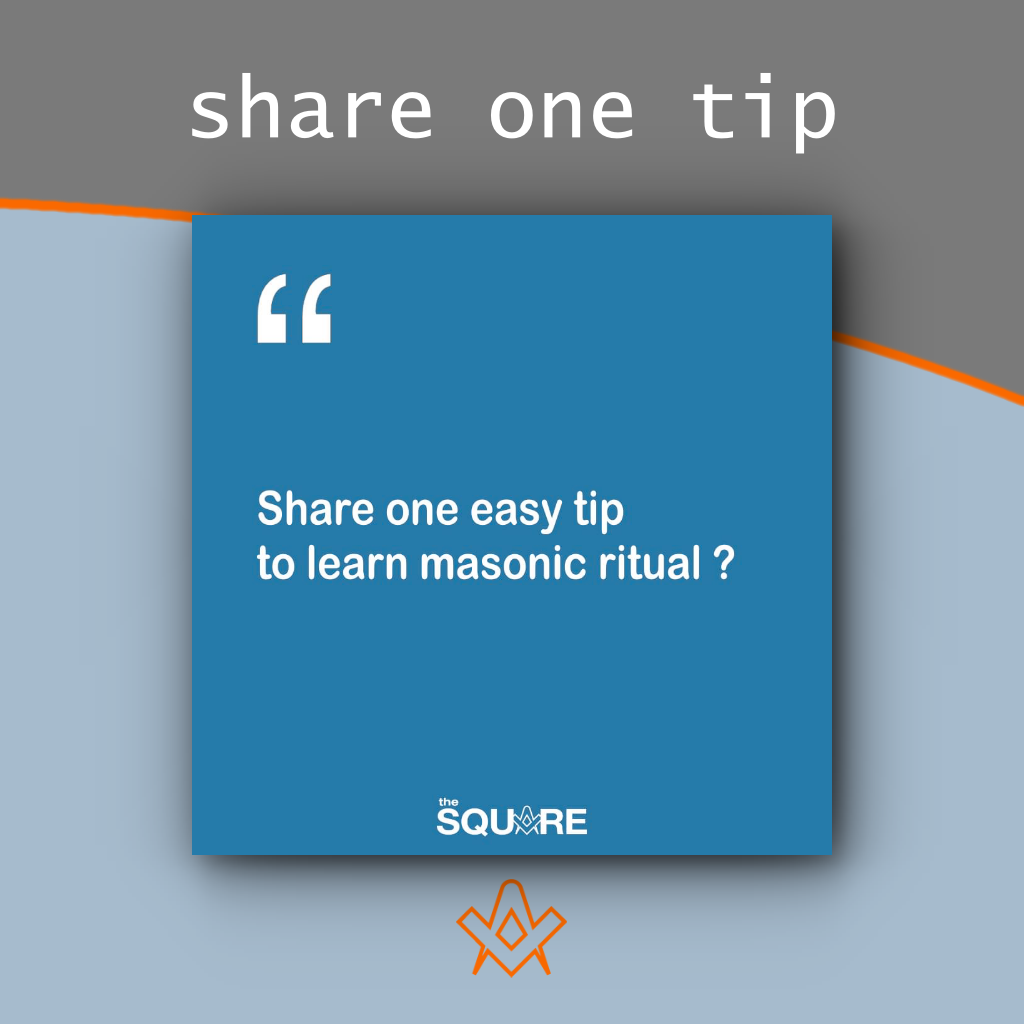We asked Facebook followers; ‘ Share one easy tip to learn masonic ritual ‘
This MEME was shared to Facebook recently and I have included some of the replies below.
But first, I wanted to share with you my tip, how I learn ritual fast.
Step 1
I normally start with a clean sheet of A4 ( Letter USA ), folded in half so I have four sides of A5.
Then I draw five or six vertical lines equally spaced across each side of the A5 page
So each line is about 1” ( 25mm ) apart
Lets take the Working Tools as a simple example:
‘I now present to your notice the Working Tools of an EAF.’
I now write down the first letter of each word in the column, in a rhythm of three. I capitalise the important words and substitute numbers when possible.
(I would use dots or dashes for the words not to be written)
So it would look like this:
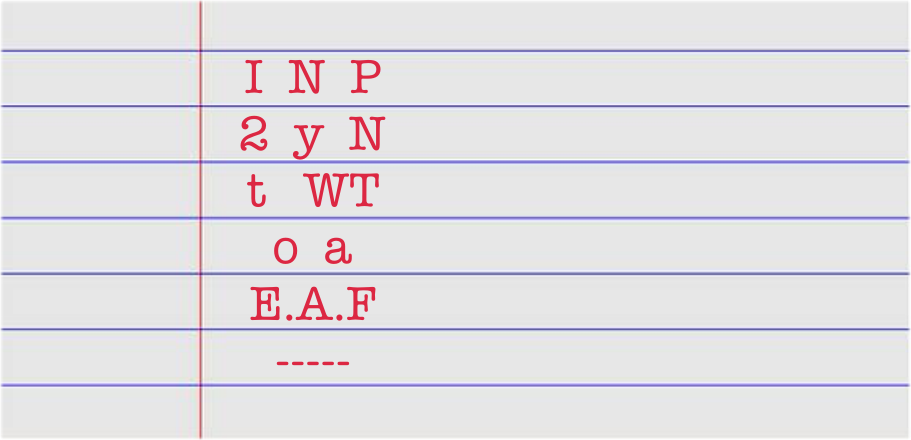
Step 2
I read from the book each little section and following it from the paper, so very soon I can read just from the paper.
I repeat reading from the paper a few times until I can recite the passage from memory. I try to visualise the paper in my mind.
I learn more short sections and recite (in my mind), then repeat by reciting all the sections learned so far.
Step 3
When I take the dog for a walk in the mornings, I will go through the whole ceremony, and as no one is around, I speak the words aloud.
It helps me if I hear the words as I speak them. If I get stuck for a word, I refer back to the sheet of paper (Baxster, our dog has being installed in the Chair many times!!)
Also, I try to plan it so that I can do my part of the whole ceremony about 2 – 3 weeks before the meeting.

Tips from others
Harvey Lapp: Memorize one sentence (or one or two words) at a time, in order. Repeat the lines from the beginning, entirely from memory every time you are alone. Occasionally read your ritual code and compare it to what you have memorized.
Adam Robery: Reading out loud helps me greatly
Tony Morgan: Pay attention during your degree.
Jim Murphy: Personally I like to learn in front of a full sized mirror.
Bill Caren: Learn the ritual backwards. Therefore you learn the last paragraph first. You learn it first, say it the most. Therefore, when in the Lodge, your ritual gets better, the longer it is.
W. Pat Comer: Read it aloud to your self for 2 weeks before you start
Daniel Joseph Kaelin: After memorizing text I negate the inner voice by turning on the TV to interfere with my recall. Like a quarterback practicing for a game in a noisy stadium.
Daniel Crossley: Once you’ve learned it, try to recite it to yourself while you type it out on your computer in private in Word. They always say you really remember something when write it out. Obviously don’t save it and delete straight away.
Lins O’Riley: Practice and learning sentence by sentence. Plus have an understanding of what you’re reading so it makes a greater impact when reciting (and you can throw in a few of your own words when stuck).
Darrian Tefft: I recommend learning the meaning of it at the same time it helps solidify it in your mind.
Steven Wilson: Say it aloud and learn it with as much time before the degree as possible. You’ll find yourself running through it in your head numerous times before the degree and that goes a long way to not only improve recollection under the gun but also to identify which parts are weaker than others.
Kristian Hoffmann: Repetition is the cousin to success.
Brian Meredith: Practice daily if only for a short time, and practice out loud as often as possible.
Dan Nourse: Memorize one paragraph at a time. Start by memorizing one sentence.
Harry Workman: Remember the particular degree and the night you received it, basically a roadmap of the evening . At least for the three main. Memorizations. Helped me a lot .
Shawn Garrison: Been doing this for 14 years….I struggle with memorizing anything my whole life. Opening and closing I still struggle and degree work (????) but I have also learned not to fret….where one weakness lies other strengths shine. I have other qualities for masonry then perfect or even good degree work.
James Thayer: I learn faster when my cell phone is off. My cell phone isn’t off very often.
James Thayer: If it’s not in code then code it. You can quickly learn to read the code because you do remember what it is, you just need a few letters of each word to prompt you. Write out your code. Learn to read your code. Delete every other word in the code and read that. Delete half of that and learn to read it. Keep cutting your code until you have a symbol for each paragraph. Then you just have to structure it in mind.
James Thayer: Don’t discount the power of a positive attitude. If you believe you can you probably will. Look at all the brothers that came before you. They could and none of them are any better than you can be. You have everything they did and if you don’t they will give it to you.
Pat Cholka: Practice. You need to find the method that works for you. But practice every day…several times a day.
Pat Cholka: Oh. And it’s not easy…no one said it would be easy. But it’s worth it!
Tim Bonney: If you have the space in a room, set up a few chairs and a table in the setup of your lodge. Walk through the ritual as you are learning it.
Chaz Walker: What you can record or write down: record yourself saying it and play it back to yourself, saying it with yourself. Also reach out to brothers and ask who is willing to practice with you. I know for me personally if any brother would call me and ask to practice I would love that and wished it happened more often.
Jozef Horopapera: A big mirror.
Steve Jersey: Paragraphs…. 1 of them at a time!!
AJ RM: Think of 3s.
Geoffrey Toulmin: Read ‘The Art of Memory’ recently released to find out how the ancients did it.
AJ RM: Memorize it no prompts unless you are 100 years old and memory isn’t as good as used to be follow and understand the ritual in YOUR DAILY LIFE and PRACTICE WHAT YOU PREACH.
George Butler: Learning ritual is like sawing a log. By doing a little each day the job is soon done. The most important thing is to remember to pick up the saw!!!
Reece Valentine: Agree with walk and talk. If you deliver ritual standing learn it standing.
Kenny Jack: Will, determination & focus carries you a long way.
Michael Daburn: Walk and talk!
Michael Sadler: ‘The Five Minute Ritualist’.
Greg Jett: Find the rhythm.
Further Reading:


Ritual in Mind:
A Memory System for
Learning Masonic Ritual Tools
This title offers a visual memory system for learning Masonic ritual. It is intended to nurture younger Masonic brethren in learning Masonic ritual.
As a head teacher and past university lecturer, the author has applied his research into memory retention to learning Masonic ritual.
Ritual in Mind is a short booklet that explores the theory behind visual memory retention techniques and applies this to the working tools of the first three degrees in the Craft to enable brethren to become confident ritualists.
Learning Masonic ritual can be a daunting prospect. Ritual in Mind explores a visual memory technique that will improve the ability to learn and recite Masonic ritual.
In addition, Ritual in Mind could become an essential text for supporting the mentoring process for Provincial mentoring scheme.

Memory Palaces and Masonic Lodges:
Esoteric Secrets of the Art of Memory
In Antiquity, the art of memory was a mnemonic device that allowed an orator, such as Cicero, to recall all the points he wished to make by associating each of them with an image or architectural element in the site he was speaking.
When this art was rediscovered in the Renaissance, hermetic thinkers like Giordano Bruno reworked it into a method that allowed them to acquire knowledge with the creation of “memory palaces.”
The elements of these memory palaces were not intended to trigger the memory but would actually transform into talismanic objects with knowledge entirely new to the seeker.
In this book, Charles B. Jameux shows that this hermetic reworking of the classical art of memory was no mystery to operative Masons, who grafted it onto their own rituals, catalyzing the transformation of operative Masonry into speculative Masonry.
He shows how the hieroglyphic writing used during the Renaissance in the art of memory provided the groundwork for one of the most esoteric elements of masonic practice: the grasp of the realm of image by the letter, where symbols were “buried” within words.
Using archival evidence from 17th-century Scotland and earlier, combined with the research of modern scholars such as Frances Yates and David Stevenson, Jameux argues that the creation of speculative Freemasonry can be traced back 100 years earlier than conventional history records–to 1637, when the first recorded use of the Mason’s Word appeared and with it, the first known appearance of the symbolic Temple of Solomon.
He follows Giordano Bruno’s visit to the British Isles in the late 16th century and the subsequent activities of the men he met there, showing that Masonic symbolism owes much of its current form to early memory palaces, which represented the Masonic lodge and temple in their fully imaginary states.
Revealing the pivotal role of the memory palace and hermetic traditions in early Masonic symbolism, Jameux sheds new light on the Masonic questions asked of each initiate and the spiritual importance of the Temple of Jerusalem to Freemasonry.
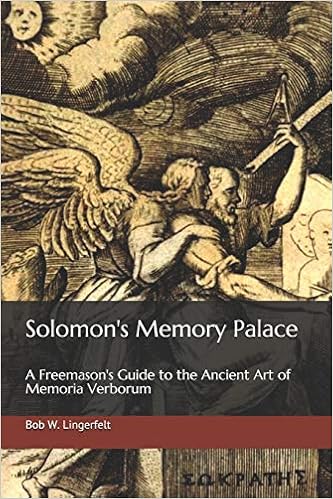
Solomon’s Memory Palace:
A Freemason’s Guide to the
Ancient Art of Memoria Verborum
“Test every fellow of the craft and every apprentice on the art of memory and science thereof.” The Second William Schaw Statutes (1599)
Freemasons have unique memorization needs. Long passages must be remembered verbatim, yet there are strict restrictions on writing, recording, or even speaking certain esoteric portions outside of the lodge, making unsuitable many of the memorization techniques used by the general public. Fortunately, the craft is not without its working tools.
Solomon’s Memory Palace provides step-by-step instructions on how to construct the rare memoria verborum memory palace and discusses the curious ties between the art of memory and Speculative Freemasonry.
Recent Articles: skills
 7 Soft Skills Taught In Freemasonry Discover how Freemasonry nurtures seven irreplaceable soft skills—collaboration; Communication, Teamwork, Empathy, Flexibility, Conflict Resolution, Active Listening, and Trustworthiness. Explore how these essential human attributes, grounded in emotional intelligence and ethical judgment, remain beyond the reach of AI. |
 Freemasonry and Reskilling in the age of AI The article explores the challenges and strategies organizations face in reskilling their workforce in the era of automation and artificial intelligence. It highlights the need for companies to view reskilling as a strategic imperative and involve leaders and managers in the process. The article also emphasizes the importance of change management, designing programs from the employee's perspective, and partnering with external entities. |
 Ten Central Commandments or Principles of Freemasonry Embrace the wisdom of Freemasonry's teachings in your personal journey towards self-improvement and stronger leadership. By upholding virtues of integrity, compassion, and respect, and uniting these with a commitment to continuous learning and social responsibility, inspire change. Transform yourself and the world around you, fostering a legacy of positivity and enlightenment. |
 Freemasonry: A Guide to Fatherhood In the sacred halls of Freemasonry, fathers discover a hidden power to transform their parenting journey. With its timeless values, supportive community, and life-enriching teachings, Freemasonry empowers fathers to provide a moral compass, foster self-improvement, build stronger connections, and embrace the confidence and wisdom needed to navigate the complex realm of fatherhood. |
 Courage as a core value in Freemasonry Freemasonry, a revered fraternity, prioritizes virtues like honesty and charity. However, courage is foundational. From Plato to Maya Angelou, courage is vital for other virtues. Freemasonry's teachings, referencing events like Gettysburg, emphasize diverse courage forms. In today's divided world, Masons promote and exemplify courage, understanding its importance in facing challenges. |
 How Freemasonry Cultivates Ideal Entrepreneurial Traits Freemasonry's cryptic rituals hold timeless lessons for building entrepreneurial greatness. Through tests of passion, vision and skill, Masonic teachings forge ideal traits like grit, creativity and alliance-making needed to seize opportunity and elevate enterprises. The right commitment unlocks code for entrepreneurial success. |
 What you see praiseworthy in others "What you see praiseworthy in others, carefully imitate, and what in them may appear defective, you will in yourself amend". This passage of Masonic ritual (Taylors Working, Address to the w |
 How to Learn Ritual with a Learning Disorder So what do you do when faced with that little blue book? Most Masons when first looking at the ritual book can understandably be fazed – the tiny print, the missing words, the questions and answers! Learning ritual can be a challenging task for anyone, especially individuals with learning disorders, but it is not impossible. Here are some tips to help make the process easier. |
 A "mind palace", also known as a "memory palace", is a technique for memorizing and recalling information. How would your life change if you could remember anything and everything? Discover the 'Mind Palace' and all will be revealed. |
 What is leadership and who does freemasonry help develop those skills needed to be a better leader |
 A story of the 'Ruffians' – those individuals whose paths cross ours, who feel entitled to seize and consume the property of others that they have not earned. A lesson to build character to be a better citizen of the world. |
 Now we are back in the Lodge room once again, maybe it is time to review how we learn and deliver ritual and look at different ways of improving that process. |
 Making an advancement in Masonic Knowledge can become far easier when you 'learn how to learn'. |
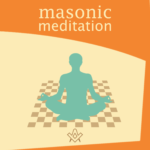 Learn how to practise Masonic meditation in a busy world with all its care and employments |
 Struggling to learn your ritual? Become a 5-Minute Ritualist with the aid of a book of the same name. |
 Day in the life of a Freemason As we start a new year, maybe start it with a new habit? |
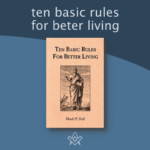 Ten Basic Rules For Better Living Ten Basic Rules For Better Living by Manly P Hall |
 How can we use masonic leadership skills to avoid confrontational situations? |
 How the Trivium is applied to Critical Thinking - {who, what, where, when} - {how} - {why} |
 The Seven Liberal Arts - why 'seven', why 'liberal', why 'arts'? |
 How to improve your public speaking skill with 6 techniques |
 Do you need to speak in public, or present Masonic ritual without notes ? |
 What are logical Fallacies and how to spot them |
 Share one easy tip to learn masonic ritual; Some good tips from Facebook followers |
 How can we use the 7 secrets of the greatest speakers in history |
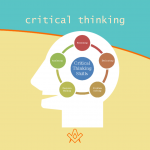 What is a critical thinker and what are their characteristics? |
 Share one personal skill Freemasonry helped you to improve? How can we make practical use of the lessons taught in Masonic writings? |
 An introduction to the art of public speaking - speak with confidence |
 Seven Liberal Arts and Sciences What do you know about Seven Liberal Arts and Sciences |
 Three Words That Will Change Your Life This article discuss a common situation found in many lodges - a difficulty in holding a conversation with a stranger. |
 Al - Khwarizmi live c750 - c820 is credited as being the father of Algebra, being asked what is Man, give his answer in an algebraic expression |
masonic knowledge
to be a better citizen of the world
share the square with two brothers

click image to open email app on mobile device
Tubal Cain
Masonic Apron NFT
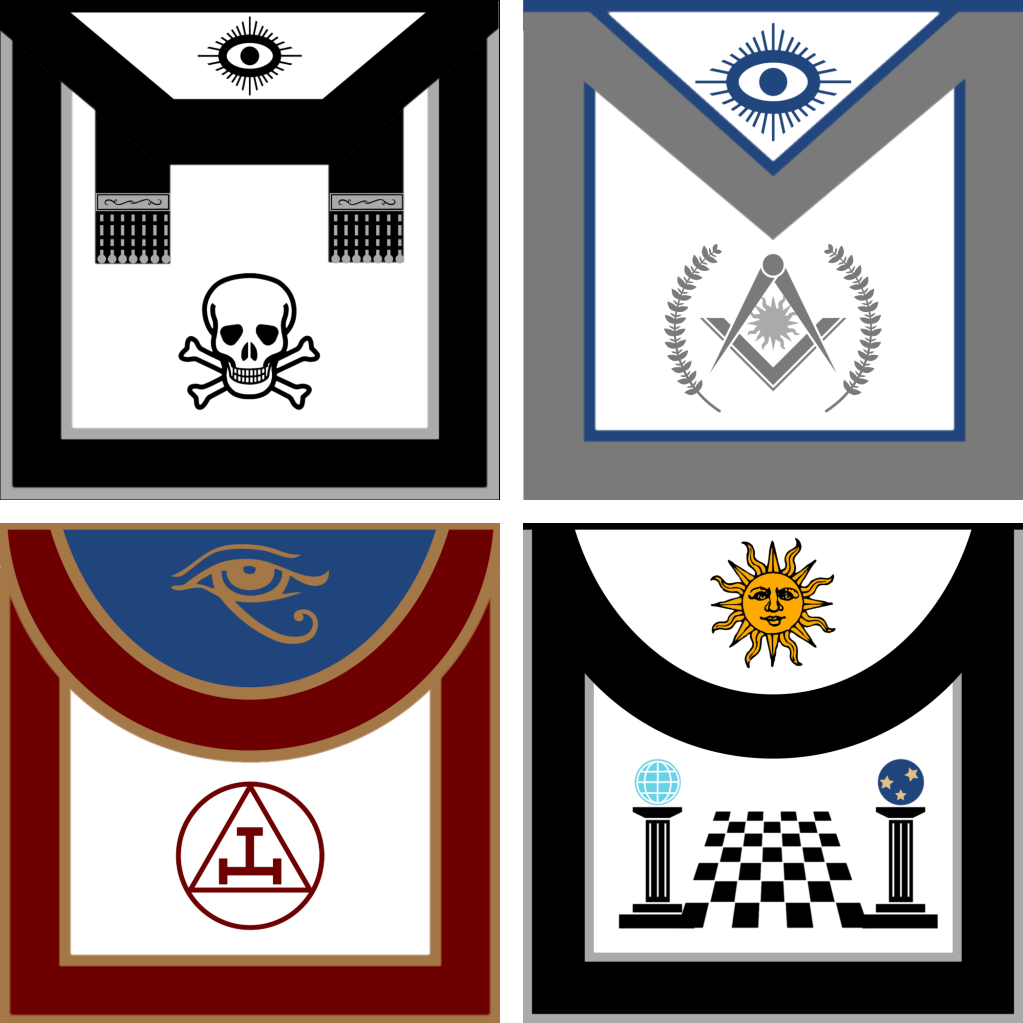


Each NFT includes the JPEG image plus a full size masonic apron and shipping worldwide
